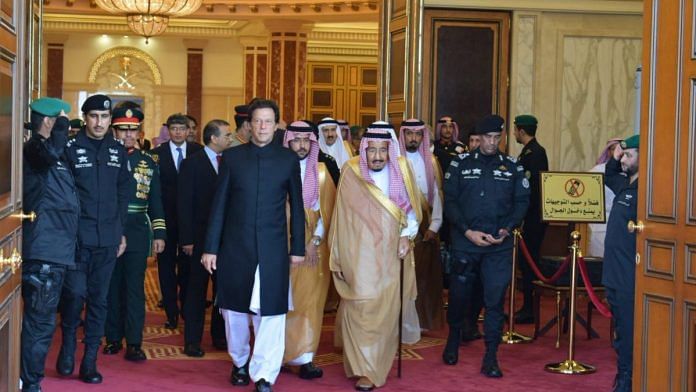Here’s what’s happening across the border: Moody’s underscores importance of IMF bailout for Pakistan’s economy; Pak won’t succumb to US’ policy on Afghanistan, says Qureshi.
Imran Khan to fly to Saudia Arabia next week
Pakistan Prime Minister Imran Khan will fly to Saudi Arabia next week — his second visit in a month — to seek financial aid and to reduce dependence on the International Monetary Fund.
The Express Tribune reported that Khan’s visit is aimed at seeking financial assistance from Saudia Arabia that could help Pakistan to avoid the IMF bailout package or renegotiate with the Fund from a position of ‘strength’.
According to government sources, Khan who is set to visit the country from 22 October to 23 October, “will try to convince the Saudi royal family to approve some financial assistance, as the country is looking for at least $5 billion in cash from Saudi Arabia and China”.
Pakistan’s gross foreign currency reserves have further reduced by $219 million to $8.1 billion and this has made meeting its international financial obligations even more difficult.
Khan’s first visit to the kingdom, after assuming office, was on 18 September.
IMF had earlier stated that Pakistan is facing a $12 billion financing gap. To address this problem, the country is on the lookout for other options of funding mainly from its list of friendly countries. In this regard, the Prime Minister recently hinted that there are chances Pakistan might not move IMF.
Moody’s says IMF bailout will be helpful for Pakistan
Global ratings agency Moody’s has explained why an IMF bailout for Pakistan would be particularly helpful for its economy from a particular standpoint, reports Daily Times.
The agency said in a statement that the financial aid from the Fund would help Prime Minister Imran Khan and his government to advance their “structural policies agenda”, in aspects such as pro-business policies, tackling corruption, reforming state-owned enterprises, increasing government spending and widening the tax net.
While the agency has said that aid from IMF would be “credit positive” for the country as it will provide “cheap, stable source of external financing”, it will additionally help in “macroeconomic rebalancing”.
However, Moody’s has warned that external and fiscal challenges continue to pose challenges, especially with respect to investments, imports and external borrowing under China-Pakistan Economic Corridor’s (CPEC) projects. The CPEC projects, it said, will approximately amount to 9-10 per cent of GDP in fiscal 2019 and higher global oil prices will not let import bill see a cost reduction.
It has further estimated that Pakistan’s total external financing needs for fiscal 2019 would amount to $30 billion.
Pakistan will resist US pressures on changing Afghanistan policy
Foreign minister Shah Mehmood Qureshi has said Pakistan cannot be pressured to follow some other country’s foreign policy objectives, The Express Tribune reports.
Qureshi, who was in Dushanbe to attend Shanghai Cooperation’s 17th meeting of the Council of Heads of Government Thursday, was asked by reporters if there were chances Washington would compel Pakistan to follow its line of set goals in Afghanistan, to which he replied that his country would not give in to US’ strong-arm tactics under any circumstance.
Qureshi also welcomed the meeting between Taliban and US officials, held on 13 October in Qatar.
He reiterated Pakistan’s long-standing policy of utilising dialogue, and not force, as means to “witness peace in Afghanistan”, which he added was his country’s “top foreign policy objectives”.
The foreign minister’s comments came just a day after Henry Ensher, acting deputy assistant secretary of State Department for Pakistan, said that Pakistan should let go of its old policy for Afghanistan.
He maintained that the US will continue to pressure Pakistan until it doesn’t change its policy, saying: “In fact, we have seen some steps having been taken from Pakistan side but we have not seen decisive steps on the part of Pakistan that terrorists will not be able to use Pakistan soil”.
FATF to suggest steps to remove Pakistan from ‘grey list’
A nine-member delegation of Financial Action Task Forces (FATF), the global watchdog on terror financing, has finalised a report suggesting measures that could remove Pakistan’s name from the ‘grey list’, reports Dawn.
Pakistan was officially placed on FATF’s grey list on 27 June for failing to act stringently against terror financing on its territory.
The report, prepared by the Asia-Pacific wing of FATF, is the result of 11 days of on-site deliberation with officials in Pakistan on the legal and institutional frameworks which were deployed to keep a check on terror financing and money laundering.
The document titled ‘Exit Report’, which according to a source, will be submitted Friday to the Pakistan government includes 40 recommendations that have been classified under 11 outcomes performance benchmarks.
The same source has also claimed that Pakistan has complied with more than 50 per cent of these recommendations but has expressed doubt whether this would be enough for Pakistan to come out of the grey list.






